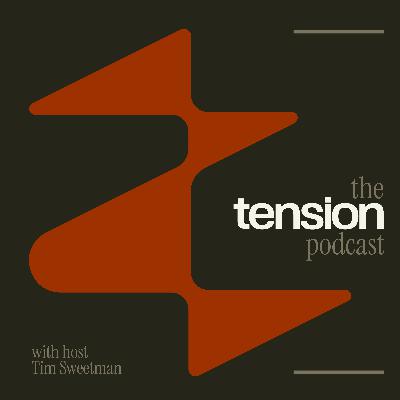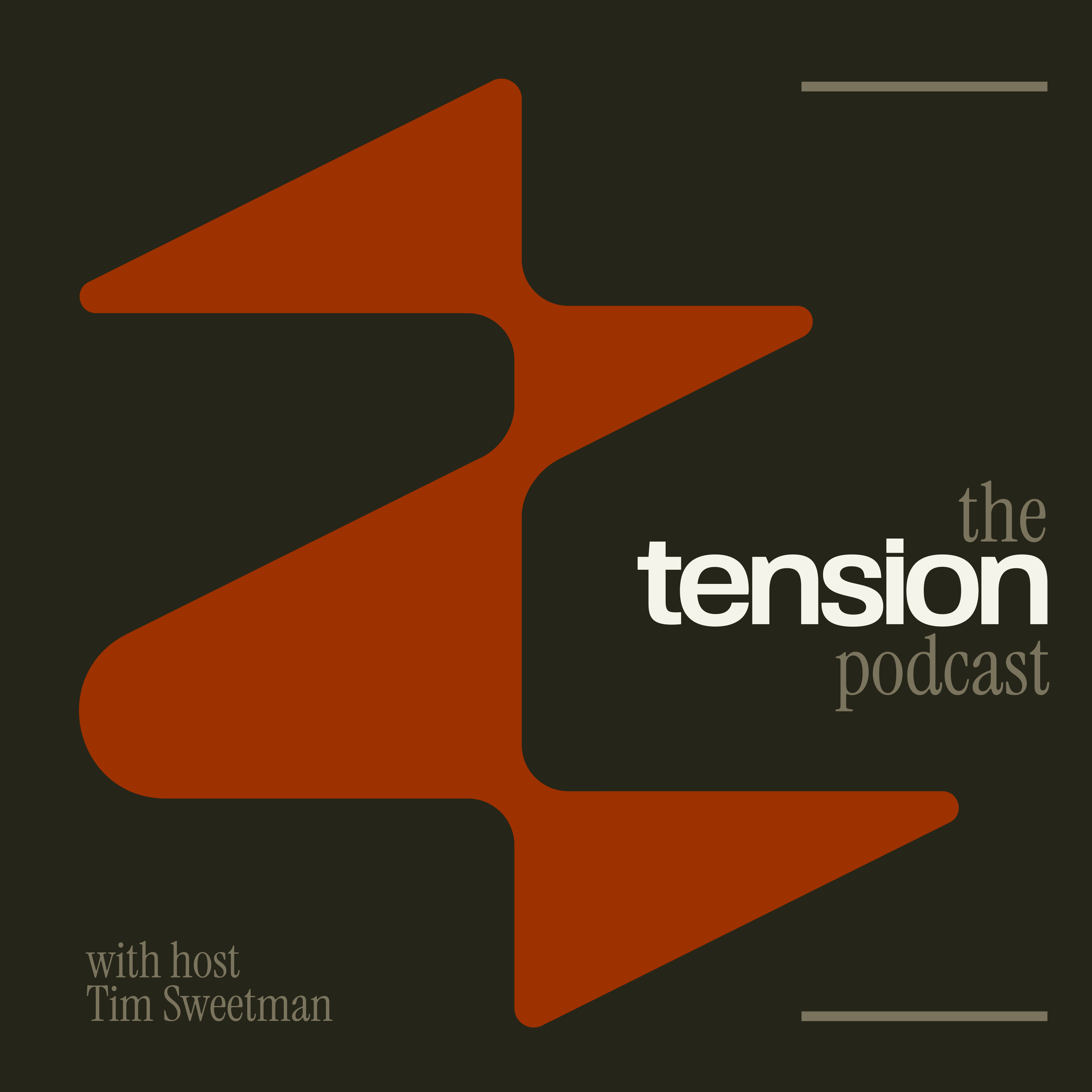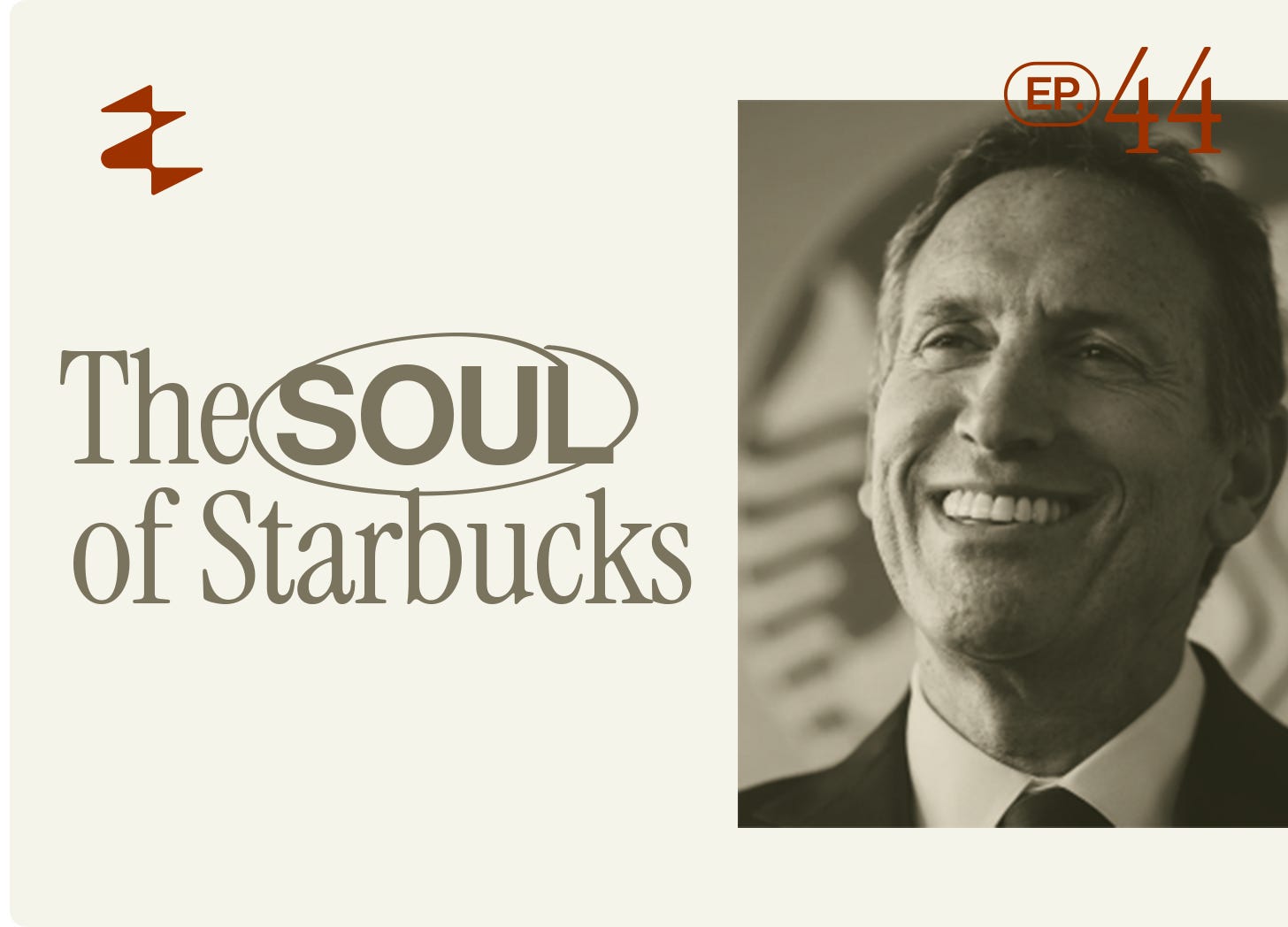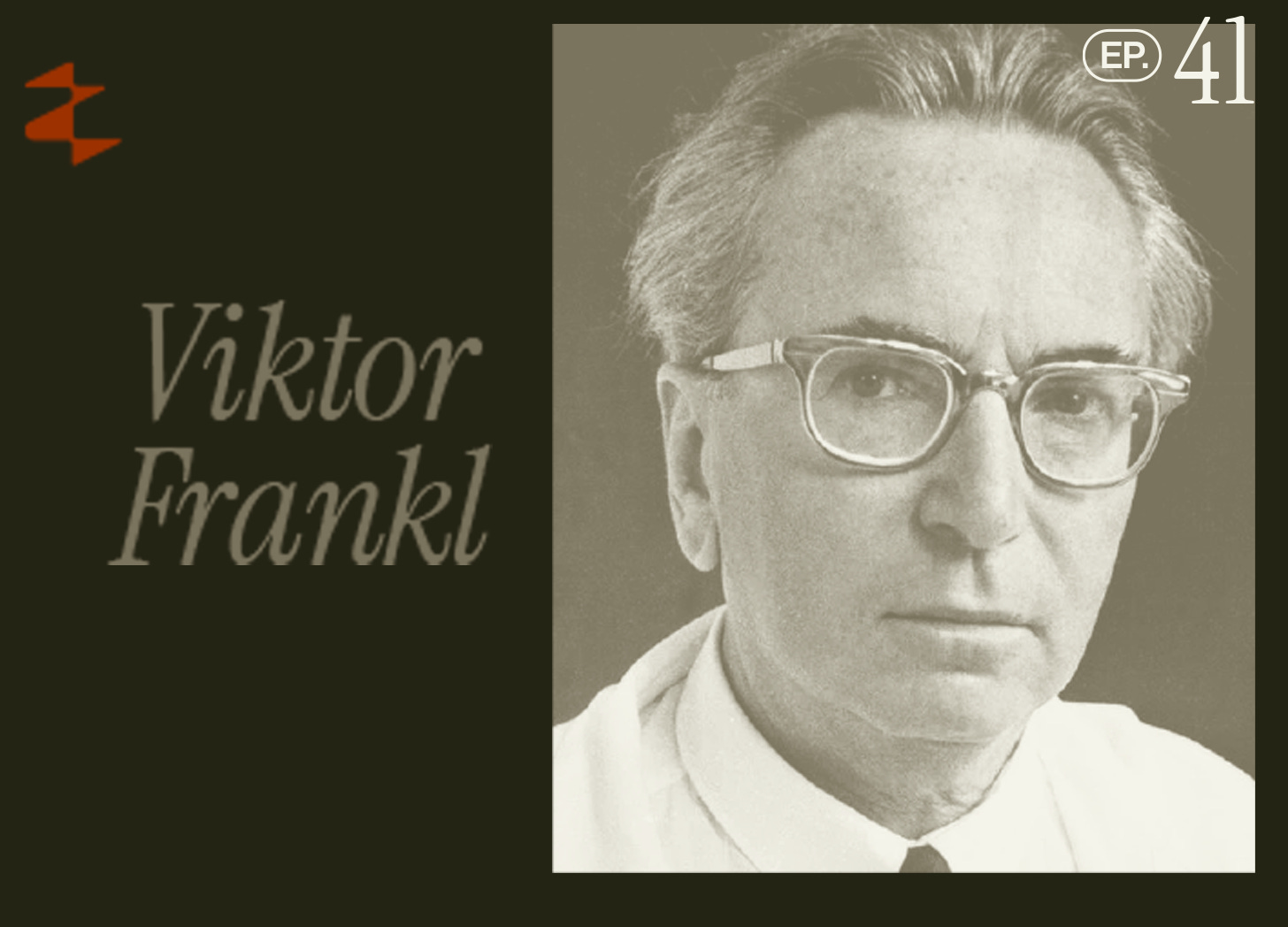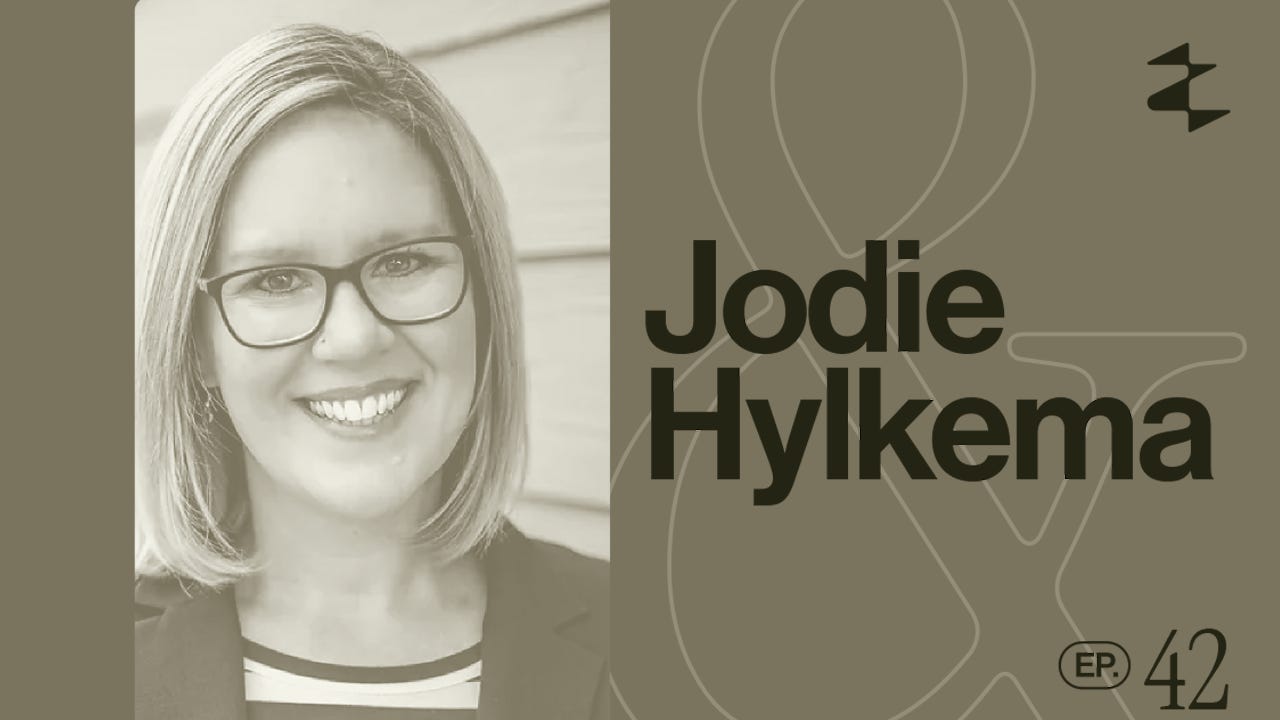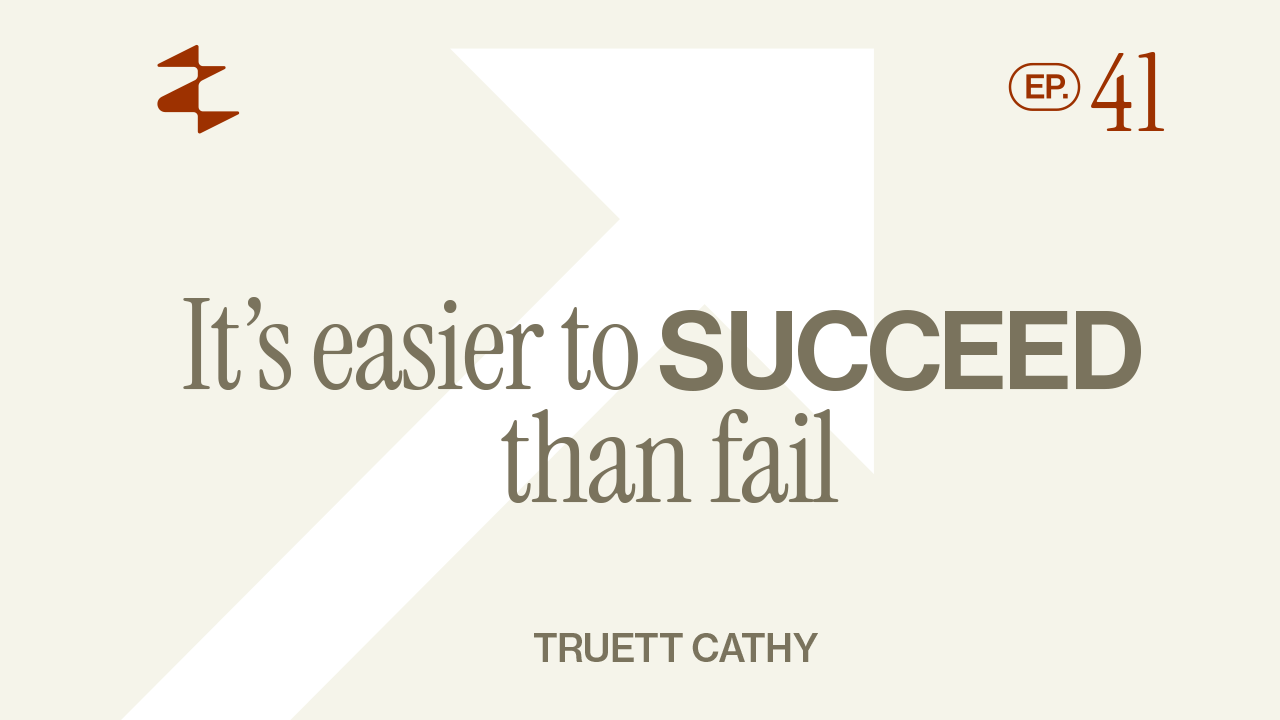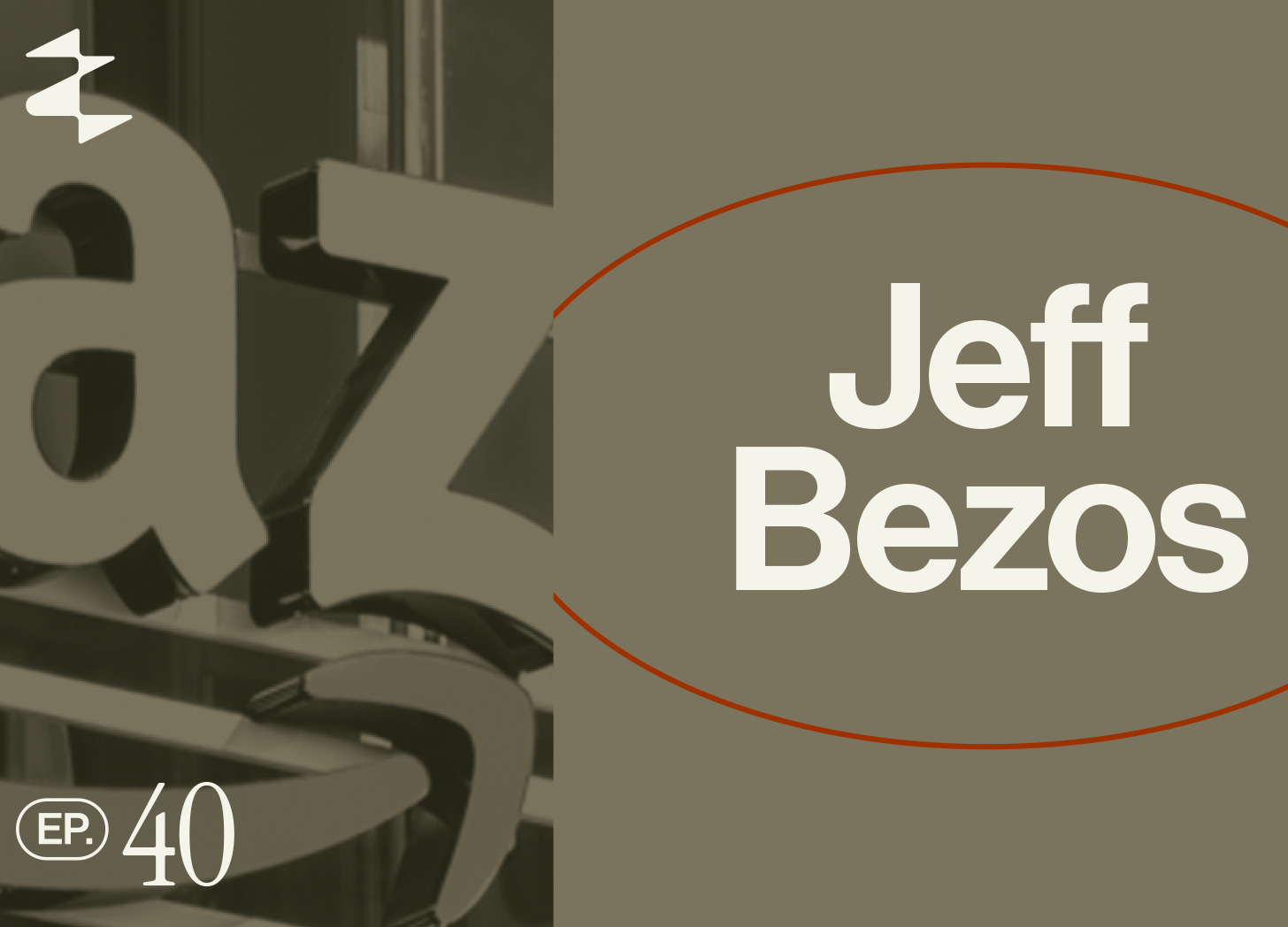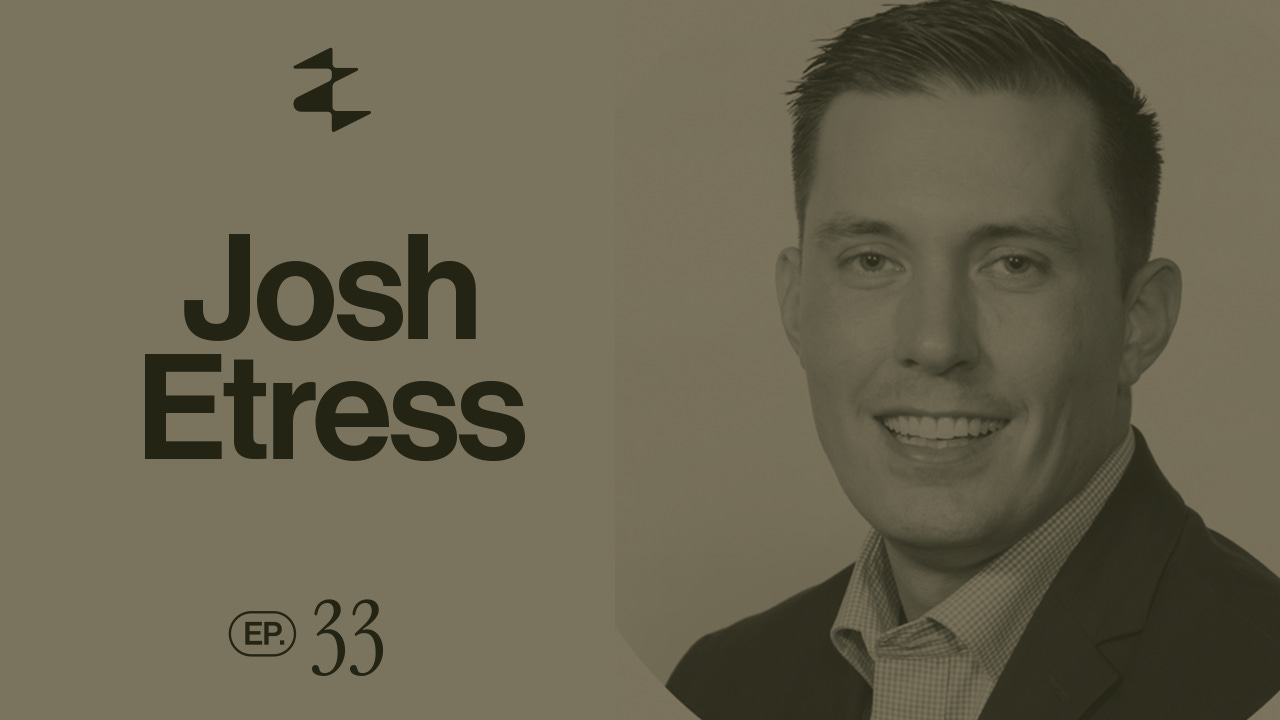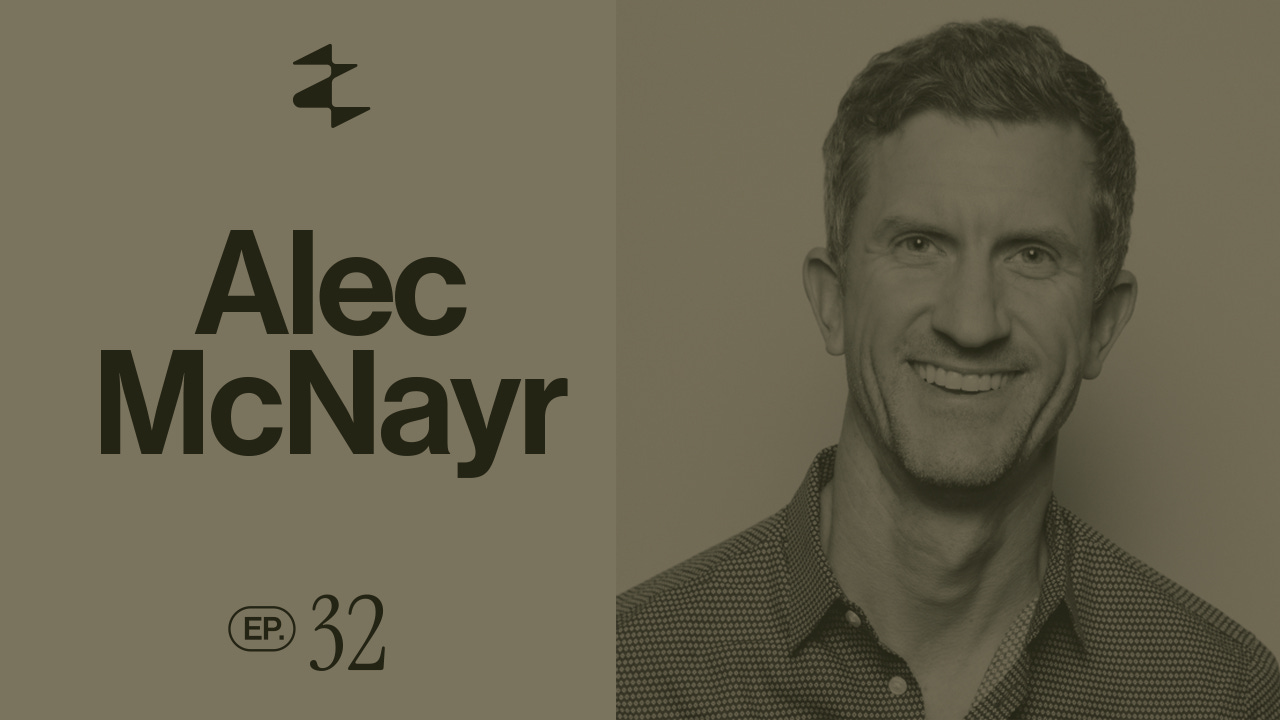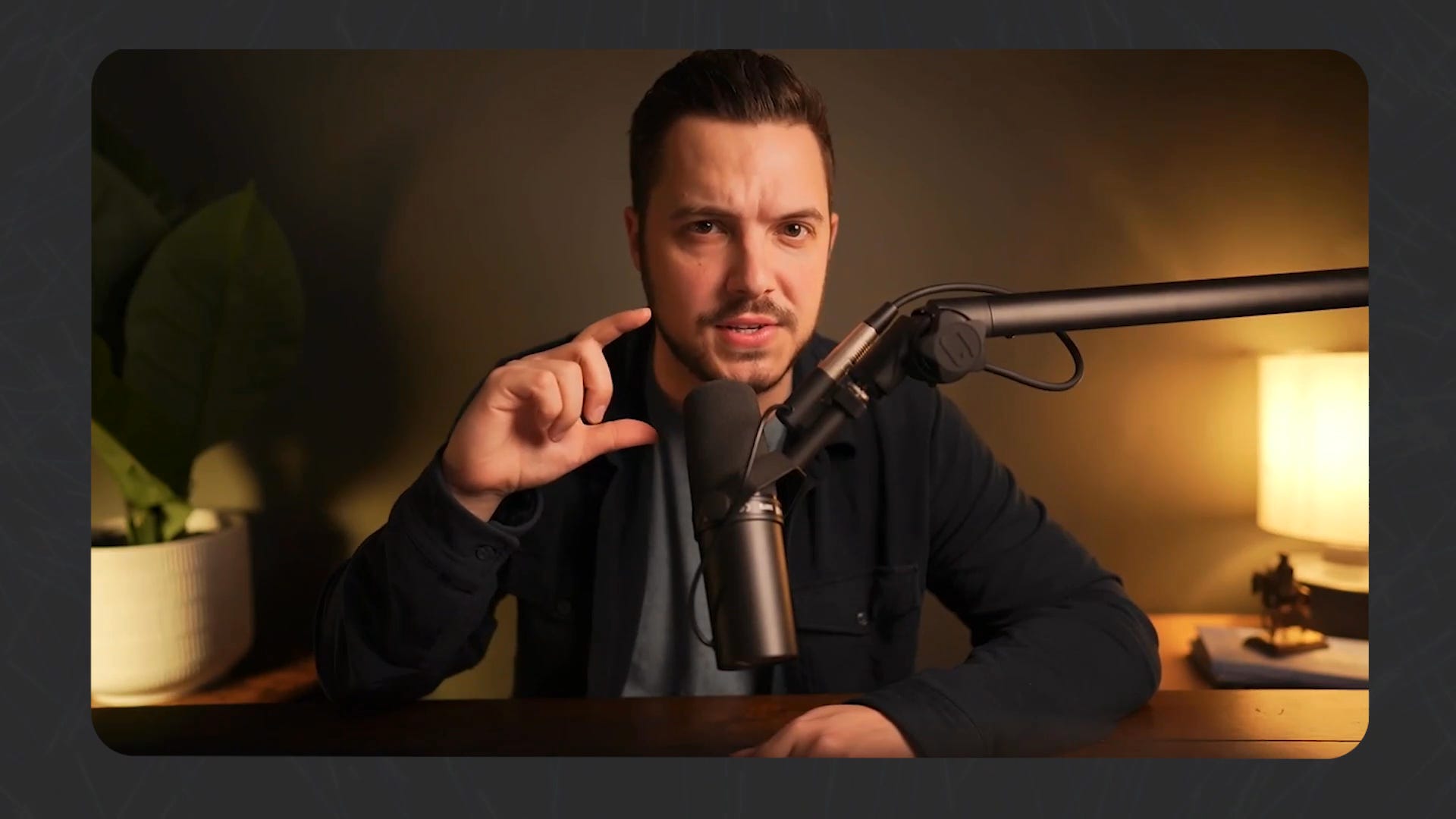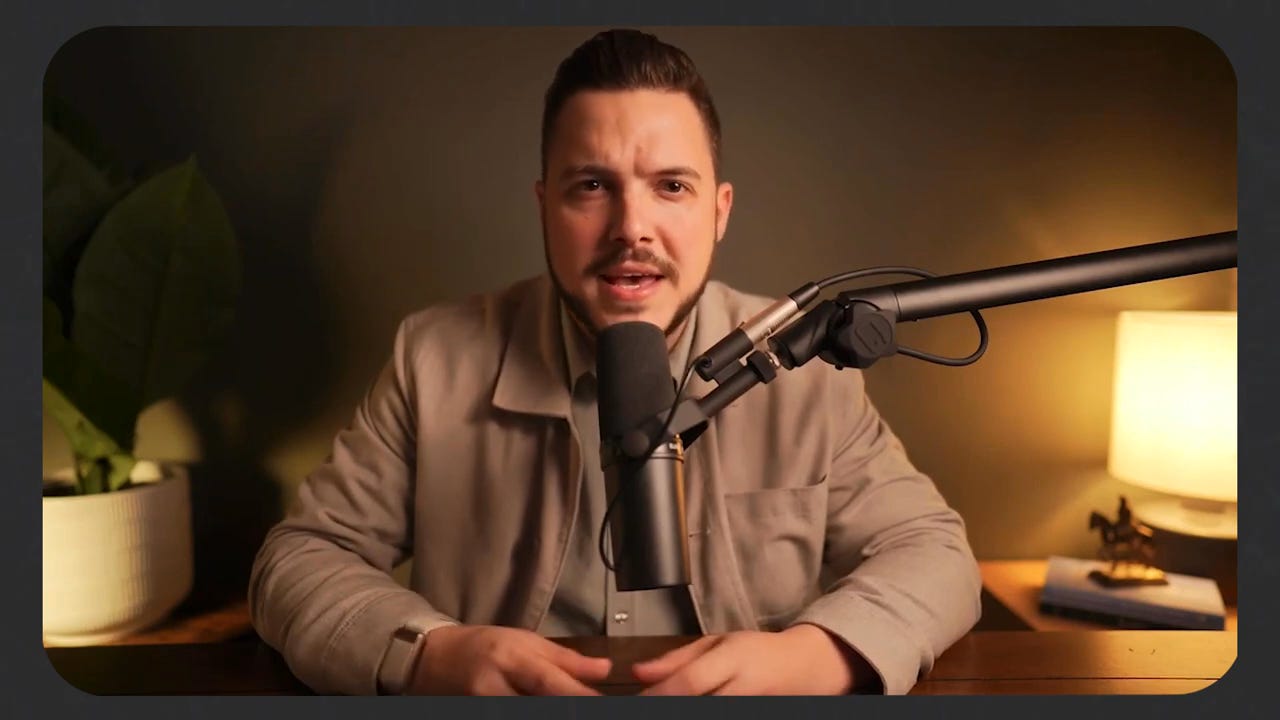Discover The Tension Podcast
The Tension Podcast

The Tension Podcast
Author: Tim Sweetman
Subscribed: 2Played: 22Subscribe
Share
© Tim Sweetman
Description
The Tension Podcast equips leaders to embrace complexity, transform opposing ideas, and unlock powerful breakthroughs. Through thought-provoking interviews, insightful book reviews, and deep-dive explainers, we explore how mastering paradoxes can lead to clarity, alignment, and innovation in work and life.
www.timsweetman.com
www.timsweetman.com
49 Episodes
Reverse
What if your greatest compulsions are the key to unlocking your calling?That question opened one of the most powerful conversations I’ve ever had—a deep dive into identity, leadership, pain, and calling with my friend Trevor Hightower, founder of Hightower. But this isn’t just theory.Trevor flipped the script and walked me through the actual identity discovery process he uses with founders, fund managers, and investors.If you’re a founder, leader, or creative trying to align your life and work with who you actually are (not who you're trying to impress), this is for you.Step 1: Identify the Words That Marked You"When someone speaks the truth about who you are, it doesn’t hit your head. It hits your heart." —Trevor HightowerWe all have words of identity spoken over us at different points. Some healed us. Some wounded us.Here’s your tactical challenge:List 3-5 encouragements that felt true when you heard them.Think back to moments where someone said:* "You’re a leader."* "You bring people together."* "You see what others miss."Now ask:* Who said it?* When did they say it?* Why did it matter?For me, a turning point was when someone called me a diplomatic leader. I’d never heard that before. But it helped me reframe years of tension and challenge into something essential and God-given.🌟 Step 2: Use 3 Tools to Frame Your GiftingYou can’t lead others until you know yourself. Trevor walked me through how elite leaders use personality frameworks to triangulate their identity.Use these three tools (and compare notes):* Five Voices* My Voice Order: Connector → Pioneer → Creative* What’s yours? Identify your top voice and blindspot.* The Enneagram Type 3* Known as "The Achiever"* Key struggle: Mistaking performance for identity* Graham Duncan's Compulsion Exercise* Prompt: "What are you most compulsive about that gives you energy?"“What if your compulsions are the center of your calling?”Once you’ve gone through all three, distill your identity into 3 identity words.Mine?* Intentional Leader* Authentic Connector* Creative Builder🚀 Step 3: Build Your Life Around Clean FuelThere’s a massive difference between dirty fuel (fear, comparison, performance) and clean fuel (clarity, calling, identity).Ask yourself daily:“Am I operating out of my true self or my false self right now?”Trevor’s simple prayer for alignment:* “God, how can I encourage and connect today from who I really am?”Design your business, your calendar, even your relationships to align with those identity words.Do more of what feels like play for you:* For me: whiteboards, vision sessions, facilitating offsites, one-on-one coffee meetings.Make your compulsions the flywheel of your organization.Resources Mentioned* Becoming a King by Morgan Snyder (YouTube Series)* Five Voices by GiANT* The Enneagram Type 3* Trevor Hightower's Newsletter (This is Good)* Masters of Moments Interview* Main Street Summit PresentationIf this helped, forward it to someone who’s wrestling with identity, burnout, or disillusionment in leadership.And hit reply: What 3 words describe your true identity?Until next time,Tim Get full access to Tension at www.timsweetman.com/subscribe
Peter Greer—CEO of HOPE International and one of the strongest voices in faith-driven leadership—dropped by to talk about what it really takes to lead something meaningful… without wrecking your soul, your marriage, or your mission in the process.From microfinance in post-Soviet countries to prayer rooms inside Fortune 100 companies, this one’s loaded.If you're a founder, builder, pastor, operator, or just someone who doesn’t want to wake up 20 years from now wondering how the heck you drifted so far from who you were meant to be—this is required listening.💥 THE BIG IDEAS1. Hope International’s Origin StoryBuilt in the rubble of the Soviet collapse. A pastor in Ukraine said, “Your help isn’t helping.” So they stopped giving handouts—and started empowering local entrepreneurs.* Today: 3.2 million entrepreneurs funded* $1.8B lent* 98% repayment rate* Operates in 27 countriesThis is microfinance with eternal ROI.2. The Ugly Side of Doing GoodGreer’s seen ministries bulldozed (literally), friends steal while he’s on honeymoon, and dreams vanish overnight.When Zimbabwe’s “Operation Cleanup Trash” hit, it wiped out years of work with a single bulldozer.3. Ministry vs. Your SoulPeter was traveling 120 nights a year. Ministry was thriving. His family? Not so much.The wake-up call? He wrote a resignation letter to his wife. Told her: if this ever feels off again, he’s done.Now:* Travel cap = 75 nights* Home at 5pm* One-on-one “dadventures” with each kid* Practices “wasting time” with prayer cards* Reads his own eulogy every January4. Mission Drift: The Silent KillerHarvard. YMCA. Princeton. Drifted from their Christ-centered roots.Greer says drift is a creep, not a leap. It’s death by a thousand “good” decisions.Drift-proof hacks:* Read the founder’s intent annually* Vet board members like your legacy depends on it (it does)* Bake succession into your DNA* Ask your team, spouse, and kids: “How am I doing?”5. Leadership Hacks That Actually Stick✅ Cap your travel.✅ Write your resignation letter (and mean it).✅ Write your eulogy—and live backwards from it.✅ Make prayer the operating system, not an add-on.✅ Don’t just scale—slow.🛠️ RESOURCES TO STEAL* Hope International* LEAD with Prayer Cards* Mission Drift – Peter Greer & Chris Horst * Lead with Prayer – Peter Greer, Ryan Skoog * The Spiritual Danger of Doing Good – Peter Greer * Sacred Pace – Terry Looper Quotes“No one drifts toward greater missional fidelity. It’s courage and conviction—or bust.”“I was building a thriving ministry while my family wasn’t thriving.”“Small steps, compounded by time, lead to massive outcomes—good or bad.”WHO THIS EPISODE IS FOR* Nonprofit leaders trying to scale without selling out* Faith-driven founders torn between mission and momentum* Operators who know success can cost your soul* Anyone who wants to stay mission true in a world full of driftTIM’S TAKEPeter Greer isn’t just smart—he’s battle-tested. He’ll make you cry, rethink your priorities, and then hand you tools that actually work.Write your eulogy. Ask your spouse how you’re doing. Cap your travel.You’ll feel the difference. Get full access to Tension at www.timsweetman.com/subscribe
Throughout this conversation, Andrew Clark shares:* His personal faith journey* Insights on thriving in the paradoxes of business and ministry* Practical strategies for integrating spiritual convictions with entrepreneurial excellenceIf you’re passionate about faith-driven entrepreneurship, discovering innovative leadership models, or embracing complexity without sacrificing core values, this episode will resonate. Subscribe for more interviews that blend faith, innovation, and real-world business impact.About AndrewAndrew Clark is the Managing Partner at The Jeremiah Fund, bringing a fresh approach to venture capital by combining strategic funding with hands-on discipleship. Prior to The Jeremiah Fund, Andrew produced The Lion’s Den in Birmingham—a Shark Tank–inspired event spotlighting entrepreneurs driven by both profit and purpose.A graduate of Samford University (Classics & Philosophy) with a background in real estate, Andrew focuses on encouraging faithfulness in founders, building healthy teams and cultures that create enduring enterprises. His mission is simple: help leaders navigate the valleys of entrepreneurship, celebrate the peaks, and deliver lasting impact.Key Links & Resources* To Know and Live Substack: candrewclark.substack.com* Wanting: The Power of Mimetic Desire in Everyday Life: Amazon* Mercenaries & Missionaries (John Doerr): Watch on YouTube* Things Hidden: The Life and Legacy of René Girard (Documentary): YouTube* The Lion’s Den DFW: thelionsdendfw.org* Pareto Principle: fs.blog/power-laws* Ho Nam: altos.vc* Ho Nam Venture Lotto: altos.typepad.com* You Are Not a Lottery Ticket (Peter Thiel): YouTube* Bryce Roberts – The Indie Era of Startups: Medium* Mercenaries vs. Missionaries (Article): Knowledge@Wharton* Nick Saban – Trust the Process: YouTube* The Score Takes Care of Itself (Bill Walsh): Amazon* Sources of the Self (Charles Taylor): Amazon* The Lion’s Den Birmingham: thelionsden.us* Thrive Farmers Coffee: thrivefarmers.com* Invest Like the Best: joincolossus.com/series/invest-like-the-best/* John Doerr: YouTube* Founders Podcast: founderspodcast.com* Francis Schaeffer – No Little People: Amazon* George MacDonald – Ordering Your Private Life: Amazon* Level 5 Leadership (Jim Collins): jimcollins.com* Faith Driven Entrepreneur: faithdrivenentrepreneur.org* Mimetic Theory: Wikipedia* René Girard: Internet Encyclopedia of Philosophy* Barnhart Crane and Rigging: barnhartcrane.com* Stewardship vs. Ownership: YouTube* Pete Ochs: GospelPatrons.org* Called to Create: YouTube* Trae Stephens – Faith Collides: faithcollides.com/traestephens_bonus* Trae Stephens Event (Silicon Valley): A Letter a Day Substack* Faith Driven Entrepreneur Podcast: faithdrivenentrepreneur.org/podcast* Paul Graham – How to Do Great Work: paulgraham.comConversation Timestamps* 0:00:00 – Intro: Christians in Business and the Struggle with Excellence * 0:01:00 – Welcome to the Tension Podcast and Its Mission * 0:02:00 – Guest Introduction: Andrew Clark and the Jeremiah Fund * 0:03:00 – What Does 'Venture Differently' Mean? * 0:07:00 – The Importance of Partnerships in Entrepreneurship * 0:09:00 – Why the Name 'Jeremiah Fund'? * 0:11:00 – Contrasting Traditional Venture Capital with 'Venturing Differently' * 0:17:00 – Balancing Investor Mandates with Founder Support * 0:20:00 – Andrew’s Life Story and Perspective on Faith and Work * 0:25:00 – Lion's Den: A Faith-Driven Business Movement * 0:29:00 – Redefining Excellence in Christian Business * 0:31:00 – Faith and Work: Integration or Separation? * 0:34:00 – Ambition, Life’s Work, and Calling * 0:38:00 – Lessons from Historical Figures on Calling and Ambition * 0:43:00 – Driven vs. Called Leadership Models * 0:48:00 – Critiques and Challenges in the Faith-Driven Movement * 0:53:00 – Real-World Examples of Faith-Driven Businesses * 0:57:00 – Key Traits of Successful Founders * 1:02:00 – Best Advice and Life Lessons from Andrew Clark * 1:03:00 – Where to Find Andrew & The Jeremiah FundConnect & Follow* Twitter: @timsweetman* Instagram: @tim.sweetman* YouTube: Tim Sweetman* TimSweetman.comAdditional Resources* Dream Studio Course: dreamstudiocourse.com* Ozlo SleepBuds: ozlosleep.com/timsweetman* Eight Sleep: refer.eight.sl/ayrngsh5Thank you for reading! If this conversation helped you rethink how faith intersects with entrepreneurship, feel free to share, comment, or subscribe for more content like this.Enjoy this conversation with Andrew Clark, and stay tuned for more content that challenges how we think about faith, ambition, and building meaningful enterprises in a complex world. If you found value, feel free to share this post or leave a comment below. Your feedback helps shape future discussions! Get full access to Tension at www.timsweetman.com/subscribe
Wendell Berry wrecked me with this book. Get full access to Tension at www.timsweetman.com/subscribe
Episode Summary This episode explores Howard Schultz's book Onward: How Starbucks Fought for Its Life without Losing Its Soul, detailing Starbucks' journey through the 2008 financial crisis and its subsequent transformation. The host analyzes Schultz's leadership philosophy, Starbucks' core values, and the challenges faced during this pivotal time.Key Takeaways* Schultz's leadership philosophy centers on balancing profit with social conscience* Starbucks lost its way in 2007 due to rapid expansion and loss of focus on core operations* The importance of maintaining brand authenticity and customer experience during growth* Schultz's return as CEO in 2008 to lead the company's transformation* The role of employee (partner) engagement in delivering exceptional customer experiences* Implementing customer feedback systems like MyStarbucksIdea.com* Balancing efficiency with maintaining the "romance" of the Starbucks experience* The challenges of closing 600 stores and its impact on communities* Applying lean methodologies to improve operations without compromising qualityQuotes* "As a business leader, my quest has never been just about winning or making money. It has also been about building a great, enduring company, which has always meant trying to strike a balance between profit and social conscience." - Howard Schultz* "No business can do well for its shareholders without first doing well by all the people its business touches." - Howard Schultz* "Success is not sustainable if it's defined by how big you become." - Howard Schultz* "Starbucks never set out to be cool. We set out to be relevant." - Howard SchultzPeople Mentioned* Howard Schultz (former CEO and Chairman of Starbucks)* Jim Donald (former Starbucks CEO)* Michael Dell (founder of Dell Technologies)* Jim Senegal (co-founder and former CEO of Costco)* Steve Jobs (mentioned briefly)* Cliff Burrows (Starbucks leader)* Daniel Henninger (Deputy Editor of the Wall Street Journal)* Bono (U2 frontman, quoted on business ethics)Books Mentioned* Onward: How Starbucks Fought for Its Life without Losing Its Soul by Howard SchultzCompanies/Organizations Mentioned* Starbucks* Dell* Costco* McDonald's (as a competitor)Concepts and Ideas Discussed* Integrative thinking in leadership* Brand authenticity and customer loyalty* The "Third Place" concept in retail* Balancing growth with maintaining company culture* Crisis management in large corporations* The importance of customer feedback in business transformation* Lean methodologies in retail operations* Corporate social responsibility* The role of company culture in business successStarbucks Initiatives Mentioned* MyStarbucksIdea.com (customer feedback platform)* Starbucks Rewards program* Entertainment strategy (selling music and movies in stores)* Pike Place Roast (as a product development example)* Lean techniques implementation in storesEpisode Highlights* [00:01:00] Introduction to Howard Schultz's book "Onward"* [00:05:00] The "beverage of truth" and shutting down all stores for training* [00:08:00] Signs of hubris and overextension into entertainment* [00:15:00] The importance of emotional connection in Starbucks' value proposition* [00:19:00] Implementation of MyStarbucksIdea.com* [00:22:00] Balancing business transformation with preserving company culture* [00:27:00] The critical role of store managers in Starbucks' success* [00:29:00] Decision to close 600 stores and its impact* [00:34:00] Howard Schultz's personal approach to competition and customer loyalty* [00:36:00] Applying lean methodologies to improve store operations Get full access to Tension at www.timsweetman.com/subscribe
In this episode, Tim Sweetman delves into the profound wisdom and insights from Viktor Frankl's influential book, "Man's Search for Meaning." As a Holocaust survivor and renowned psychiatrist, Frankl's experiences in the concentration camps served as the foundation for his groundbreaking philosophical and therapeutic approach, logotherapy. This episode explores the central themes of Frankl's work, emphasizing the significance of finding meaning in life, even in the face of unimaginable suffering and adversity.Key Takeaways:* The Importance of Tension for Personal Growth and Meaning: Frankl argues that a certain degree of tension is essential for mental health and personal development. He suggests that what humans truly need is not a tensionless state, but rather the striving and struggling for a worthwhile goal or a freely chosen task. This tension between what one has already achieved and what one still ought to accomplish is the driving force behind self-actualization and the discovery of meaning in life.* The Paradox of Happiness: One of the central ideas in Frankl's work is the paradox of happiness. He maintains that directly pursuing happiness can lead to frustration and disappointment. Instead, he suggests that happiness is a byproduct of accepting uncertainty and tension in life, and focusing on finding meaning and purpose. By dedicating oneself to a cause greater than oneself or loving another person, one can experience a profound sense of fulfillment and happiness.* Three Ways to Find Meaning in Life: Frankl identifies three primary ways in which individuals can discover meaning in their lives: * Creating a work or doing a deed: Engaging in creative pursuits or accomplishing tasks that contribute to the world around us. * Experiencing something or encountering someone: Finding meaning through the appreciation of beauty, art, nature, or forming deep connections with others through love and relationships. * The attitude taken towards unavoidable suffering: When faced with unavoidable suffering, individuals have the opportunity to find meaning by choosing their response and maintaining a courageous and dignified attitude in the face of adversity.* The Power of Choice and Human Dignity: A central theme in Frankl's work is the importance of recognizing and exercising our freedom to choose, even in the most dire circumstances. He argues that the ability to choose one's attitude and response to any given situation is what sets humans apart and allows us to maintain our dignity and find meaning, even in the darkest of times. Frankl emphasizes that while we may not always have control over our circumstances, we always have the freedom to choose how we respond to them.* Tragic Optimism: Finding Hope in the Face of Pain, Guilt, and Death Frankl introduces the concept of tragic optimism, which is the ability to remain hopeful and find meaning despite the presence of what he calls the "tragic triad": pain, guilt, and death. He suggests that by embracing tragic optimism, individuals can transcend their suffering and find purpose and significance in their lives, even when confronted with the most challenging and painful experiences.Notable Quotes:* "Everything can be taken from a man but one thing: the last of the human freedoms—to choose one's attitude in any given set of circumstances, to choose one's own way." (p. 66)* "Those who have a 'why' to live, can bear with almost any 'how'." (p. 76)* "The salvation of man is through love and in love." (p. 37)* "Suffering ceases to be suffering at the moment it finds a meaning." (p. 113)* "The meaning of life is to be discovered in the world rather than within man or his own psyche." (p. 115)* "Man does not simply exist but always decides what his existence will be, what he will become the next moment. By the same token, every human being has the freedom to change at any instant." (p. 131)* "Life is never made unbearable by circumstances, but only by lack of meaning and purpose." (p. 104)* "In some way, suffering ceases to be suffering at the moment it finds a meaning, such as the meaning of a sacrifice." (p. 113)* "The point is not what we expect from life, but rather what life expects from us." (p. 77)* "Love is the only way to grasp another human being in the innermost core of his personality." (p. 111)Logotherapy and Paradoxical Intention: Frankl's experiences in the concentration camps led him to develop logotherapy, a form of existential analysis that focuses on the search for meaning as the primary motivational force in human life. Logotherapy emphasizes the importance of helping individuals identify and pursue their unique purpose, even in the face of suffering and adversity.One of the key techniques used in logotherapy is paradoxical intention, which involves encouraging individuals to embrace and even exaggerate their fears or anxieties. By doing so, patients can break free from the cycle of anticipatory anxiety and self-fulfilling prophecies. Frankl provides examples of how paradoxical intention can be used to treat conditions such as insomnia, obsessive-compulsive disorder, and phobias.Frankl's Legacy and Influence: "Man's Search for Meaning" has had a profound impact on the fields of psychology, psychotherapy, and personal development. Frankl's insights into the human condition, the importance of meaning, and the resilience of the human spirit have inspired countless individuals to find purpose and hope in the face of adversity.Frankl's work has been widely recognized and celebrated, with "Man's Search for Meaning" having sold over 16 million copies worldwide and being translated into more than 50 languages. The Viktor Frankl Institute, founded in Vienna, Austria, continues to promote and advance Frankl's ideas and the practice of logotherapy.Applying Frankl's Insights to Modern Life: While Frankl's experiences in the concentration camps may seem far removed from the challenges of modern life, his insights and wisdom remain highly relevant and applicable. In an age of increasing automation, technology, and potential for existential vacuum, Frankl's emphasis on the importance of finding meaning and purpose is more important than ever.Individuals can apply Frankl's ideas to their own lives by:* Identifying and pursuing personal values and goals that align with their unique sense of purpose.* Embracing challenges and viewing them as opportunities for growth and meaning.* Cultivating a sense of responsibility and commitment to something greater than oneself.* Practicing self-awareness and exercising the freedom to choose one's attitude and response to life's circumstances.* Seeking out experiences that promote personal growth, connection, and the discovery of meaning, such as engaging in creative pursuits, fostering meaningful relationships, and contributing to the well-being of others.ConclusionViktor Frankl's Man's Search for Meaning offers a timeless and profound exploration of the human condition, the importance of finding purpose, and the resilience of the human spirit. Through his own experiences and the development of logotherapy, Frankl provides valuable insights and tools for individuals seeking to lead meaningful and fulfilling lives, even in the face of adversity and suffering.By embracing the key takeaways from Frankl's work, such as the importance of tension for personal growth, the paradox of happiness, the three ways to find meaning in life, the power of choice and human dignity, and the concept of tragic optimism, individuals can cultivate a deeper sense of purpose and navigate life's challenges with greater resilience and hope.Resources Mentioned:* Man's Search for Meaning by Viktor E. Frankl (Amazon link)* The Will to Meaning: Foundations and Applications of Logotherapy by Viktor E. Frankl (Amazon link)* Recollections: An Autobiography by Viktor E. Frankl (Amazon link)* The Viktor Frankl Institute Vienna (Website)* Viktor Frankl: A Life Worth Living by Anna S. Redsand (Amazon link)* The Unheard Cry for Meaning: Psychotherapy and Humanism by Viktor E. Frankl (Amazon link)Additional Resources:* Yes to Life: In Spite of Everything by Viktor E. Frankl (Amazon link)* The Doctor and the Soul: From Psychotherapy to Logotherapy by Viktor E. Frankl (Amazon link)* Prisoners of Our Thoughts: Viktor Frankl's Principles for Discovering Meaning in Life and Work by Alex Pattakos and Elaine Dundon (Amazon link)* Viktor Frankl's Search for Meaning: An Emblematic 20th-Century Life by Timothy Pytell (Amazon link)* Finding Meaning in the Second Half of Life: How to Finally, Really Grow Up by James Hollis (Amazon link)* The Power of Meaning: Crafting a Life That Matters by Emily Esfahani Smith (Amazon link)* The Pursuit of Meaning: Viktor Frankl, Logotherapy, and Life by Joseph B. Fabry (Amazon link) Get full access to Tension at www.timsweetman.com/subscribe
Jodie’s passion is investing in people. She thrives helping clients process and gain perspective, moving them forward toward personal and professional goals.At Leadership Consultancy, Jodie coaches Operators, senior leaders and their teams on setting and achieving goals, building trust, managing conflict, owning roles in the restaurant, and developing and leveraging emotional intelligence. She conducts Operator consultations, helping them identify areas of focus and creating individual and team focused development plans. She is also a contributing writer for The Operator Pathway, Leadership Consultancy’s guidebook for Operators developing deliverables for their business framework, talent cycle, and systems and processes in the restaurant. Using one of her main strengths of developer, she cultivates growth in individuals and teams as they become the best they can be.Jodie holds a bachelor’s degree in counseling from Moody Bible Institute. She spent four years as a senior leader at Chick-fil-A™ Citrus Plaza in Redlands, CA. As an executive leader specialist, she supervised all aspects of the talent cycle, including recruiting, hiring, labor allocations and scheduling, disciplinary conversations, and leadership development. She also managed receipts, accounts receivable, accounts payable, and incremental profit opportunity in a restaurant grossing 10 million in sales and experiencing consistent 18%+ growth year-over-year. Jodie's clients use CliftonStrengths®, the Enneagram, The Leadership Challenge®, EQi® 2.0 and other models to discover deeper insights and opportunities for growth.Connect with Jodie Hylkema: LinkedIn | Leadership Consultancy Selected Links From The Episode* Mitch Rales: Are You Investing Podcast* Steve Harvey: You Gotta Jump To Be SuccessfulRecommended Books:* Turning the Flywheel: A Monograph to Accompany Good to Great by Jim Collins* The Leadership Challenge: How to Make Extraordinary Things Happen in Organizations by James M. Kouzes and Barry Z. Posner * Chasing Failure: How Falling Short Sets You Up for Success by Ryan Leak* The Dip: A Little Book That Teaches You When to Quit (and When to Stick) by Seth Godin* Leveling Up: 12 Questions to Elevate Your Personal and Professional Development by Ryan Leak* Emotional Intelligence 2.0 by Travis Bradberry* No One Understands You and What to Do About It by Heidi Grant Halvorson* Daring Greatly: How the Courage to Be Vulnerable Transforms the Way We Live, Love, Parent, and Lead by Brené Brown* David Gibson Book CollectionQuotes From The Interview* “Get comfortable with being uncomfortable because truly that is where the beauty of growth takes place. That is where we start to grow when we’re willing to say you know what this is a really really hard for me to say this person is probably not going to be happy with me when I hold them accountable but I think what a disservice we do to someone else to not address it and not give them the opportunity for their own growth.” - Jodie Hylkema* “The best leaders chase failures meaning they chase opportunities to learn.” - Jodie HylkemaPeople Mentioned* Jim Collins* Mitch Rales* Kobe BryantShow Notes* [00:00:00] Introduction to Jodie Hylkema* [00:03:50] Going from Chick-fil-A to coaching* [00:07:55] What sets Chick-fil-A apart from other brands and makes them successful* [00:10:12] Why aren’t other brands adopting Chick-fil-A’s vision* [00:13:14] Lessons leaders could apply and emphasis on core values* [00:19:27] Hardest part of leadership is clarity* [00:22:39] Getting comfortable with being uncomfortable* [00:27:00] Craving tension and leaning into the difficulty* [00:34:07] Embracing the “and” as leaders* [00:40:30] Examples of tension and ambition* [00:45:00] The challenge of making small changes and the output leads to success* [00:46:44] How the best leaders react to failure* [00:52:00] Failing and failing forward* [00:54:45] Finding balance between comfort and tension* [00:58:00] Helpful resources Get full access to Tension at www.timsweetman.com/subscribe
I read It’s Easier to Succeed Than to Fail to share the essential lessons from the founder of Chick-fil-A. S. Truett Cathy was founder and chairman of Chick-fil-A, Inc. Cathy started the business in 1946, when he and his brother, Ben, opened an Atlanta diner known as The Dwarf Grill (later renamed The Dwarf House®). Through the years, that restaurant prospered and led Cathy to further the success of his business. In 1967, Cathy founded and opened the first Chick-fil-A restaurant in Atlanta’s Greenbriar Shopping Center. Lessons from It’s Easier to Succeed Than Fail: * Things don't happen by chance, they happen by choice. Associate with winners and those with great attitudes. "Associate yourselves only with those people you can be proud of, whether they work for you or you work for them." "A less qualified individual with a good attitude would be more welcomed at my company than a highly talented individual with a bad attitude."* Generosity and care for others, even amidst business challenges, is essential. Truett was deeply moved and inspired by Gene, a blind and deaf boy he helped on a flight, saying "If I ever felt, or feel sorry for myself, I turn my thoughts to that courageous boy." "As we blessed others, we ourselves were blessed in fulfillment of Proverbs 11:25 'He who waters will also be watered himself.'"* Every problem has a solution if you persevere and get creative. When faced with shortages of building supplies after WWII, Truett said "I couldn't wait for five or six months. Ben and I had to get that building up so we could start earning a living." He drove to small towns to buy nails and scavenged wood from torn down buildings, doing whatever it took to finish construction.* Consistency is the most important aspect of business, especially in food service. "The friendliness of the staff, the expression on your face, paying attention to their special requests - all these are extremely important. People don't always go out to eat because they're hungry. They may be simply looking for fellowship or a pleasant experience."* Crisis is an opportunity in disguise. Get away from problems to find solutions. Faced with the company's first sales decrease in 1982, the executive team went on a retreat to refocus on their purpose. "As I've learned so often in life, people need to get away from a problem in order to solve it. Sitting in the midst of the trouble only makes people more conscious of the negative forces."* Craft a meaningful corporate purpose that honors God and influences others. Profit and purpose can coexist. The team developed this purpose statement: "To glorify God by being a faithful steward of all that is entrusted to us. To have a positive influence on all who come in contact with Chick-fil-A." "We wanted to be faithful to our statements, but we also were in business to make a profit. I knew the two could work together."* Stay closed on Sundays out of spiritual principle, even if it seems illogical from a business perspective. "It was just a principle that I stand very firmly on for my business... We find closing on Sunday attracts those people who give attention to spiritual growth and are family oriented."* Embrace the power of integrative thinking - face tensions and find creative resolutions that contain elements of each side. Chick-fil-A could have expanded more rapidly through franchising or going public, but Truett decided to grow slowly, stay private, and focus on people over profits. This allowed them to be extremely generous in unconventional ways.* Success takes time and persistence, like the Chinese bamboo tree that shows no growth for 4 years then shoots up 90 feet in 6 weeks. "Life is much akin to the growing process of the Chinese bamboo tree. It is often discouraging. We seemingly do the right thing, and nothing happens. But for those who do things right and are not discouraged and are persistent, things will begin to happen. Finally, we begin to receive the rewards."* It truly is easier to succeed than to fail if you do things right. "May I assure you, who are kind enough to read this book, that it is indeed easier to succeed than to fail. That it takes time to succeed and time to fail, but more time to fail than to succeed."Truett Cathy's remarkable life and leadership demonstrate the power of uncompromising commitment to faith, generosity, relationships, and a higher purpose beyond profits. His legacy inspires us to lead organizations that honor God and serve people with consistency and care.Books: * It's Easier to Succeed Than to Fail (1989) * Eat Mor Chikin: Inspire More People (2002) * It's Better to Build Boys Than Mend Men (2004) * How Did You Do It, Truett?: A Recipe for Success (2007) * Wealth, Is It Worth It? (2011) * The Generosity Factor: Discover the Joy of Giving Your Time, Talent, and Treasure (2002)Timestamps: * 0:00 Introduction* 7:24 Things don't happen by chance, they happen by choice* 12:00 Generosity and care for others is essential* 31:00 Every problem has a solution if you persevere* 36:00 Consistency is the most important aspect of business* 40:00 Crisis is an opportunity in disguise* 46:00 Craft a meaningful corporate purpose* 51:00 Stay closed on Sundays out of spiritual principle* 53:00 Embrace the power of integrative thinking* 55:00 Success takes time and persistence* 56:00 It truly is easier to succeed than to fail* 57:00 Conclusion Get full access to Tension at www.timsweetman.com/subscribe
I read every single shareholder letter written by Jeff Bezos from 1997-2023 in order to learn everything I could about how Bezos applies the concepts of integrative thinking and tension into Amazon. I was not disappointed. Bezos doesn't shy away from the discomfort of tension — he leans into it as a powerful tool for unlocking creativity and making the impossible, possible. By challenging the assumption that leaders must choose between competing priorities, Bezos has been able to carve a unique path for Amazon. His integrative thinking keeps the company relentlessly focused on customers while also building for the long term.Packed with insightful quotes and stories, I hope this episode offers you a masterclass in how to turn tension into an advantage.Intro* Jeff Bezos and Amazon embrace tension and integrative thinking to drive innovation and growth* Integrative thinking involves finding creative solutions that combine opposing ideas, rather than choosing one over the other* Great leaders lean into the discomfort of tension to unlock transformative ideasIdea 1: Embracing Long-term Thinking vs. Short-term Thinking* 1997 shareholder letter: "We are firm believers that the long-term interests of shareholders are tightly linked to the interests of our customers"* Bezos believed creating a strong business through customer obsession would ultimately benefit shareholders* Amazon makes decisions based on long-term market leadership rather than short-term profitability or Wall Street reactionsIdea 2: World-class Customer Experience vs. Low Prices* Amazon strives to offer the best of both, rejecting the traditional trade-off between high-quality service and low prices* By turning fixed costs into variable ones, Amazon can offer low prices and superior service* Bezos: "Proactively delighting customers earns trust, which earns more business from those customers, even in new business arenas."Idea 3: Invention and Customer Obsession* Bezos: "We can be a large company that's also an invention machine."* Amazon's culture of innovation is centered around core values of customer obsession* Innovations empower others, including third-party sellers, rather than solely benefiting AmazonIdea 4: Making Judgement-based vs. Math-based Decisions* Judgement-based decisions, while debated and controversial, are key to innovation and long-term value creation* Amazon combines inspiration from old models with new innovations to create unprecedented value* Bezos: "Many of the problems we face have no textbook solutions, and so we – happily – invent new approaches."Idea 5: Internal vs. External Motivation* Amazon is internally driven by a desire to impress customers, not just to best competitors* Being proactive and customer-focused allows Amazon to invent and improve before external pressure demands itIdea 6: High-velocity vs. Slow Decision Making* As companies grow, they tend to make decisions slowly; Amazon fights this tendency with a "Day 1" mentality* Type 1 decisions (irreversible) and Type 2 decisions (reversible) – most decisions are Type 2 and should be made quickly* Bezos: "The senior team at Amazon is determined to keep our decision making velocity high. Speed matters in business."Idea 7: Wandering and Experimentation* Wandering, guided by intuition and curiosity, is an essential balance to efficiency in business* Many innovations (like AWS) come from wandering and experimentation, even when the market doesn't know what it wants* Failure is a necessary part of invention; the path to success is not straightConclusion* To maintain distinctiveness, you must resist the pull to be normal and continually invest energy in being unique* Leaning into tension and integrative thinking is difficult but essential for innovation and growthBooks Mentioned:Working Backwards: Insights, Stories, and Secrets from Inside Amazon by Colin Bryar and Bill CarrThe Everything Store: Jeff Bezos and the Age of Amazon by Brad StoneThe Opposable Mind: How Successful Leaders Win Through Integrative Thinking by Roger MartinBoth/And Thinking: Embracing Creative Tensions to Solve Your Toughest Problems" by Wendy SmithAdditional Resources:* Shareholder letters from Amazon* Founders podcast, especially episode 179 Get full access to Tension at www.timsweetman.com/subscribe
In this episode of the Tension podcast, host Tim Sweetman interviews Austin Linney, a serial entrepreneur, real estate investor, business and mindset coach. Austin shares his personal journey of overcoming negative thought patterns, self-sabotage, and alcohol addiction to live a life of abundance and significance. He emphasizes the importance of taking radical responsibility for one's mindset and life choices.Austin and Tim discuss the power of an engaged, involved boss or CEO in impacting employees' lives, and the higher calling of serving others through business. They explore the role of faith in Austin's journey, learning to surrender and believe in a higher power during challenging times.Austin shares his philosophy of giving people opportunities to show greatness and the lessons he's learned from interviewing successful individuals. He recommends two influential books: What You Say When You Talk to Yourself and The Gap and the Gain.Throughout the conversation, Austin's infectious energy and passion for personal growth shine through. He encourages listeners to embrace curiosity, think for themselves, and consistently work towards becoming the best version of themselves. The episode offers insights on mindset, leadership, and the transformative power of taking responsibility for one's life.About Austin LinneyAustin Linney is a serial entrepreneur, real estate investor, business and mindset coach, and host of the weekly podcast, Construct Your Life with Austin Linney. He has built an expansive network of top professionals in leading industries, and helped countless individuals break through obstacles and become who they were meant to be. For years, Austin struggled with negative thought patterns, self-sabotage, and alcohol addiction that left him trapped in an unfulfilling job, financial struggles, and disconnected and failing relationships. When he reached a breaking point, Austin knew he needed to take radical responsibility for his mindset and his life. He dedicated everything to learning strategies, systems, and tools to break free from a self-destructive cycle and live a life of abundance and significance. Now Austin lives his passion and purpose helping people establish habits and improve their mindset so they can live the life they truly want. Whether you are looking to build a business, obtain financial freedom, or become more of who you are, Austin can help you get where you want to go.Connect with Austin Linney X | Instagram | Podcast | WebsiteRecommended Books:* Pitch Anything: An Innovative Method for Presenting, Persuading, and Winning the Deal by Oren Klaff* Flip the Script: Getting People to Think Your Idea is Their Idea by Oren Klaff * The Gap and the Gain: The High Achievers' Guide to Happiness, Confidence, and Success by Dan Sullivan, Dr. Benjamin Hardy* What to Say When You Talk to Your Self by Shad Helmstetter PhD, Douglas Martin* 10x Is Easier Than 2x by Dan Sullivan Quotes From The Interview* “I guarantee you there’s three to four to five things whether in your personal life or your business life that you’re stringing along…there’s a million things that I could do to make money but that doesn’t mean I’m going to do them because it doesn’t make me happy.” - Austin Linney* “The number one skill I see in all those people that make them happy and successful is curiosity. They’re never done learning, they got a notepad next to them and they ask questions.” - Austin LinneyPeople Mentioned* Robert Horry* Avery Johnson* Shaquille O'Neal* Jim Rome* David Perell* Joe Dispenza* Ed Mylett* Graham CookShow Notes* [00:00:00] Introduction to Austin Linney* [00:03:02] Simplicity and margins* [00:08:33] Energy and getting things done* [00:09:37] Growing up and addiction* [00:16:38] What helped Austin break a negative mindset* [00:20:46] Going to the extreme and ownership* [00:23:27] Stared in coaching* [00:26:50] Strategy to break the negative thinking * [00:35:00] Why are people afraid to make the big change* [00:39:33] What should a person do to work through criticism in making changes* [00:46:50] The impact of an engaged leader* [00:49:18] How faith is becoming part of Austin’s journey* [01:04:00] Serving and leadership Get full access to Tension at www.timsweetman.com/subscribe
(Originally released April 19, 2022 — links and resources may have changed) Gretchen Heinen is the Founder/CEO of Authsnap, a team of healthcare experts who have come together to create solutions for hospitals in the complex areas of revenue cycle management.Gretchen is a nurse turned seven-figure entrepreneur and previously was the founder of Net Worth It School, a faith-based business mentorship program that offers coaching, courses, and a monthly membership to help people create financial legacy.Gretchen started her career as a nurse but quickly reached the top of her field and felt called to do more. During the 2008-2009 recession, she and her husband faced financial difficulties, prompting her to pray for wisdom. This led to the creation of her podcast, Net Worth It, where she interviewed financially successful individuals.Through her podcast, Gretchen learned that wealth is created by building multiple income streams. She experimented with various entrepreneurial ventures, learning valuable lessons along the way. In 2020, she rebranded her podcast and business to be faith-based, aligning her work with her Christian values.As a mother and foster parent, Gretchen understands the challenges of balancing family life with entrepreneurship. She emphasizes investing in personal development, hiring coaches, and surrounding yourself with successful people to grow and reach your full potential.Gretchen is passionate about helping others develop a healthy relationship with money and view it as a tool to accomplish their mission in life. Through her Net Worth It School and podcast (now Daring Daughters), she continues to inspire and guide others on their journey to financial freedom and purposeful living.X | LinkedIn | Daring Daughters Selected Links From The Episode* Daring Daughters* Tim Ferriss' podcast* Seth Godin's blog* Ephesians 3:20 * The power of words and affirmations* Tips for drinking more water* Benefits of walking for exercise* Guide to creating a morning routine* Productivity tips for entrepreneursRecommended Books:* Think and Grow Rich by Napoleon Hill* Secrets of the Millionaire Mind by T. Harv Eker* The 15 Commitments of Conscious Leadership by Jim Dethmer, Diana Chapman, and Kaley Klemp* Mindset: The New Psychology of Success by Carol S. DweckQuotes From The Interview* "I'm okay with looking stupid or failing... I just do it. Be okay with knowing even if this fails, I'll figure it out."* "If you're going into entrepreneurship because you hate your job, don't do it because you won't succeed. You have to have a passion to solve a problem."* "Money is a tool that we get to use to do whatever it is we're supposed to do in this world that we feel is our mission."* "Our words have power... We need to be so careful about our words and what we say."Show Notes* [00:00] Introduction * [01:58] Gretchen's journey from attempting to become a doctor to pursuing nursing * [04:04] Reaching the top of her nursing career and feeling called to do more * [06:14] Starting the Net Worth It podcast and interviewing financially successful people * [08:40] Transitioning to a faith-based podcast and rebranding in 2020 * [10:23] Balancing nursing and entrepreneurship * [13:40] Overcoming the fear of failure and looking stupid * [16:55] The importance of having a passion and purpose in entrepreneurship * [19:40] Investing in yourself by getting in the right rooms and hiring coaches * [22:15] Taking action and being okay with failing * [24:42] Treating your job as an investment partner while building your business * [27:00] Changing the way we think about and relate to money * [30:25] Overcoming the belief that you're not worthy of talking to successful people * [33:40] The power of words and canceling negative words spoken over you * [37:20] Prioritizing self-care as an entrepreneur * [40:30] Micro tweaks to ensure proper nutrition, hydration, and exercise * [43:15] Gretchen's ideal daily routine and schedule * [48:40] The importance of having a plan and theming your days * [49:50] Where to find Gretchen's resources and free 5-day challenge Get full access to Tension at www.timsweetman.com/subscribe
Daniel Darling is an author, pastor and Christian leader. He currently serves as the Director of The Land Center for Cultural Engagement at Southwestern Baptist Theological Seminary and Assistant Professor of Faith and Culture at Texas Baptist College. Prior to his leadership of the Land Center, Darling served as the Senior Vice President for Communications of the National Religious Broadcasters. He also has served the Southern Baptist Convention as the Vice President of Communications at the Ethics and Religious Liberty Commission. He has also pastored churches in Illinois and Tennessee.Website | Substack | Podcast | XSelected Links From The Episode* Founders Podcast by David SenraRecommended Books:* A Non-Anxious Presence: How a Changing and Complex World will Create a Remnant of Renewed Christian Leaders by Mark Sayers* Dan’s BooksQuotes From The Interview* “The environment I was in was really rewarding, in terms of leadership was this kind of alpha you’re not a leader unless you’re a super alpha and running over people but basically that’s kind of what defined courage and leadership so I felt like am I actually a leader because I feel like I can motivate people and have vision but I don’t feel like being a jerk to people.” - Dan Darling* “Forgiveness matters…willingness to not carry with me the bitterness of my hurt and spend my whole like getting even is so important…” - Dan DarlingPeople Mentioned* Tim Keller* Dan Silva* John Grisham* Tom Brady* Steve Martin* Charlie Chaplin* Tim Alberta* Dr. Russell Moore* Morning Joe* Mark Sayers* C.S. LewisShow Notes* [00:00:00] Introduction to Dan Darling* [00:02:20] Upbringing and how father shaped Dan into who he is today* [00:10:58] Discovering ability to write* [00:15:54] Where ideas to write come from and the process* [00:21:43] Intentional in reading selection or read widely?* [00:28:05] Stress testing leadership principles* [00:35:29] Think about the mood and culture in the organization* [00:39:48] How to overcome negative reviews* [00:49:02] Evangelicals and role in America* [00:56:52] Leaning into headlines and extremes versus meeting people in real life* [01:04:50] Leadership in government* [01:08:07] Ideas on upcoming book covering being Christian and patriotism* [01:15:22] Where to find Dan Get full access to Tension at www.timsweetman.com/subscribe
Courtney Moore is the founder and president of Women & Work, as well as co-host of the Women & Work Podcast. She holds a B.A. in Religious Studies from the University of Mobile and an M.A. in Biblical Counseling from The Southern Baptist Theological Seminary. Courtney is passionate about seeing Jesus Christ honored by women as they steward their gifts and leverage their unique potential for His glory. She has been married to Brent for 15 years. They have 3 great kids and live in El Paso, TX where Brent pastors LIFEchurch.Connect with Courtney Moore: Instagram | Website | PodcastSelected Links From The Episode* Room for Nuance Podcast* Women & Work * Women & Work Podcast* Women & Work BookQuotes From The Interview* “Women have so much to bring to the table that men don’t have. So if you think about a conference room, if you have only men in there you’re going to get a perspective but guess what you don’t even really know what you're missing because you’ve never invited a woman in and heard her perspective. - Courtney Moore* “My biggest thing actually is stepping into confidence … There have been other times when fear going back to fear has really kept me complacent and that has not served our organization well or my team well.” - Courtney MoorePeople Mentioned* Nikki Lawrence * Michelle StrattonShow Notes* [00:00:00] Introduction to Courtney Moore * [00:02:12] Upbringing and what led Courtney to her leadership role* [00:07:18] What triggered in her mind the need to come up with an answer to using her gifts* [00:11:52] How are you redefining a woman that works?* [00:19:19] Leveraging the gifts of the entire people* [00:25:25] Vocation work as a calling* [00:27:18] Equality between genders* [00:30:05] So many opportunities to do good works* [00:34:10] Other women who have embraced this idea* [00:36:58] Idea of work in seasons* [00:41:22] SBC and the treatment of women* [00:45:07] Fear and a limiting mindset* [00:49:20] Being curious and being faithful* [00:53:21] Idea of humble confidence and being a reluctant leader* [00:59:39] How Courtney went about rest and recovery after burnout* [01:03:49] What Courtney is excited about in seeing this conversation move forward* [01:07:05] Courtney’s podcast Get full access to Tension at www.timsweetman.com/subscribe
Samuel D. James serves as associate acquisitions editor at Crossway Books. He is a regular contributor to First Things and The Gospel Coalition, and his writing has appeared in The Wall Street Journal, The Washington Post, and National Review. Samuel and his wife Emily live in Louisville, Ky., with their two children.Connect with Samuel James: Substack | World MagazineSelected Links From The Episode* Crossway Publishing* HemingwayRecommended Books:* Digital Liturgies: Rediscovering Christian Wisdom in an Online Age by Samuel James * Amusing Ourselves to Death: Public Discourse in the Age of Show Business by Neil PostmanQuotes From The Interview* “When it comes to writing, I try to help people have this strong sense of why. Why are you doing.” - Samuel James* “Movement itself does not mean action.” - Tim Sweetman* “When it comes to the web and the Christian life, the question so what do I do now is especially tricky, why because there’s no straight line from Christian wisdom to rejection of Technology.” - Samuel James* “There’s something about this environment that will always kind of mess up our relationship with the world because it wasn’t meant to be just you alone in your room with a device experiencing the world is meant to be so much more dimensional than that.” - Samuel JamesPeople Mentioned* Andrew Sullivan* Andrew Walker* Marshall McLuhan* Nicholas Carr* Cal Newport* Jean Twenge* Jonathan Haidt * Neil PostmanShow Notes* [00:00:00] Introduction to Samuel James* [00:02:03] How Samuel approaches writing and bringing reality into it* [00:07:37] Motives for writing, what is your “why”* [00:14:00] Quality vs quantity* [00:18:23] Book contract and having a baby* [00:20:40] Approach to writing books and process* [00:21:32] Tech sometimes get in the way of writing* [00:26:12] Advice to those who want to write a book* [00:29:30] Writing a book proposal* [00:31:16] Does a writer need to have a huge audience to start?* [00:37:15] Publishers are a business* [00:38:04] Ability to show you can write, nothing to do with social media followers* [00:40:34] Samuel’s book and embodiment vs disembodiment* [00:47:16] Digital liturgy has changed us and now we are making decisions to make sure it doesn’t change us* [00:52:44] Digital environment creeping into the physical environment* [00:55:37] Is there a way out of this and technology will make us more human?* [01:04:07] Practical ways James curates his interaction with technology* [01:08:00] What James is currently working on Get full access to Tension at www.timsweetman.com/subscribe
Desmond Lim is co-founder and CEO of Workstream, an automated hiring platform for companies hiring hourly workers. He is a graduate of Harvard and MIT Media Lab, former product manager at WeChat, and investor at Dorm Room Fund. He was named to Silicon Valley Business Journal’s 40 under 40, and was honored by Ernst and Young as an entrepreneur of the year finalist. He is based in San Francisco and lived in Palo Alto with his wife and two young daughters.Connect with Desmond Lim: LinkedIn | WorkstreamSelected Links From The Episode* Workstream* Workstream Blog* On the Clock Podcast * Founders Fund * Workstream Raises Additional $60M, Extending Series B Round to $108M* Desmond Lim in Forbes Magazine * The complete guide to applicant tracking systems* Harvard University * MIT Media Lab * WeChat* Dorm Room Fund Quotes From The Interview* “What the mind can conceive and believe it can achieve.” - Desmond Lim* “I believe in the democratization of technology for the deskless workforce. - Desmond LimPeople Mentioned* Mark Cuban * Jay-Z* Peter Thiel Show Notes* [00:00:00] Introduction to Desmond Lim* [00:02:27] Growing up in Singapore and parents’ example shaped Desmond today* [00:06:31] Lessons his parents instilled in him* [00:07:31] Importance of taking hard work seriously growing up* [00:09:03] Grateful to have made it to the U.S.* [00:10:36] Favorite failure and the challenges along the way and how he approached it* [00:14:32] Workstream is about his seventh company, learning ins and outs of business* [00:18:36] What is the one thing that you encourage founders to do?* [00:21:50] Vision for Workstream* [00:25:55] What do you share to inspire your team? Get full access to Tension at www.timsweetman.com/subscribe
Josh Etress is currently the Chief Operating Officer at Anchor Investments, America’s most generous Commercial Real Estate Company. He is also the COO of The Russell and The Gallatin Hotel. He brings experience from previous roles at WildSparq as the Vice President of Sales & Client Success, as well as years serving with Campus Outreach in Birmingham, Alabama. He is a graduate of Berry College. Josh Etress’ Personal MissionNo matter where I land, I intend to multiply leaders.Life mottos: No Reserves. No Retreats. No Regrets. #TheBestIsAhead #KeepImpactingPersonal Values:- Relentless Optimism- Bias Toward Action- Team > Self- Aggressive Learning- Focus on People & ResultsHow I think about life:Healthy things grow w/ the right soil, sunlight, and root system to produce 30x, 60x, 100x impact. Creating maximum conditions for growth; Pruning all aspects of life that don’t produce fruit.1, 5, 10, 20 year and Lifetime Targets:- Impact 100 Lives: in 1 Year- Impact 1,000 Lives: in 5 years- Impact 10,000 Lives: in 10 Years- Impact 100,000 Lives: in 20 years- Impact 1,000,000 Lives: in my lifetimeConnect with Josh Etress: LinkedIn | Substack Selected Links From The Episode* Anchor Investments * Wildsparq* POPSP* missionhotels.comRecommended Books:* The Right—and Wrong—Stuff: How Brilliant Careers Are Made and Unmade by Carter Cast* The Intentional Father: A Practical Guide to Raise Sons of Courage and Character by Jon Tyson* The 4-Hour Workweek: Escape 9-5, Live Anywhere, and Join the New Rich by Timothy Ferriss* When: The Scientific Secrets of Perfect Timing by Daniel H. Pink* Deep Work: Rules for Focused Success in a Distracted World by Cal Newport* Digital Minimalism: Choosing a Focused Life in a Noisy World by Cal Newport* Give and Take: Why Helping Others Drives Our Success by Adam Grant* Switch: How to Change Things When Change Is Hard by Chip Heath & Dan Heath * Atomic Habits: An Easy & Proven Way to Build Good Habits & Break Bad Ones by James Clear* Coaching for Breakthrough Success: Proven Techniques for Making Impossible Dreams Possible by Jack Canfield & Peter CheeQuotes From The Interview* “There’s always a legal right and there’s a moral right in real estate or a legal right and an ethical right and what that means is you can actually alter the experience that a tenant has with you by going above and beyond to educate them.” - Josh Etress* “One of the best things you can say as a leader is to say that you were right, I was wrong, will you help me, and you invite people into your personal growth.” - Josh Etress* “Logic and intuition, one is not better than the other. You have to have the right blend personally, professionally within your team within the context of your business to make the best decisions.” - Josh EtressPeople Mentioned* Carter Cast* Craig Rochelle* Adam Grant* Dave Cummings* Tim Ferris* Daniel H. Pink* Cal Newport* James Clear* Chip and Dan Heath* Angela Duckworth* Tim Keller* Jerry Bridges* Matthew HenryShow Notes* [00:00:00] Introduction to Josh Etress* [00:01:40] Journey from leadership role to real estate* [00:03:34] One thing that attracted Josh to Anchor is generosity as a core value* [00:03:57] Commercial real estate and hospitality industry are similar in challenges* [00:04:54] Flipping the idea of traditional landlord and tenant relationship on its head* [00:07:00] Generosity in going above and beyond to educate a tenant and alter their experience into a positive one* [00:07:21] Generosity in long-term impact on future partnerships* [00:08:55] Generosity in redeeming the buildings we purchase* [00:09:24] Thoughtful in creating a portfolio of real estate where people can engage* [00:10:20] How to have this mission mindset while staying in business* [00:13:04] What have you done to switch that mentality for your team and community to pursue excellence rather than maximize profit for self?* [00:17:51] Josh and Tim first meeting through Wild Spark and growth over the years* [00:19:24] How Josh evolved into the a leader that does a great job in helping others multiply and grow* [00:24:45] How do you create the right environment for your team to grow?* [00:31:12] How have you gone about getting people to feel confident enough to give feedback to their boss and how do you use that feedback* [00:39:00] How have those who’ve reported to you responded when you ask for their feedback?* [00:40:39] How are you intentional in giving and receiving feedback?* [00:46:20] The great resignation and the cultural shift* [00:50:29] How would you encourage a leader that’s found themselves in an organization they’ve allowed to become toxic?* [00:54:00] The 1-Page Plan for Your Life* [00:57:33] Many leaders don’t spend a lot of time on a strategic plan, what would you say to someone who says I don’t need this?* [01:02:18] Five key elements in time management* [01:09:53] Josh’s article on the mantra “You can do better” and getting away from that* [01:15:00] Recommended books and authors Get full access to Tension at www.timsweetman.com/subscribe
Alec McNayr is the Founder of Spotlight & Co., and former founder and COO of McBeard which was acquired by FullScreen in 2015. He is an Entrepreneurial leader, storyteller, and builder of teams. Alec advocates for creative approaches to social media, humor as a leadership development device, and remote-working strategies. He was named to the "40 under 40" list for both AdAge and Pepperdine University.Alec has also published a humor book, sold a pilot to ABC, was honored by the Webby Awards, worked for two failed dot-com companies, grew a company from two people to hundreds, and then navigated McBeard's acquisition by Fullscreen in 2015 (and then to AT&T/WarnerMedia in 2018).Connect with Alec McNayr: Spotlight | Substack | LinkedIn | XRecommended Books:* Decade By Decade by Bobb Biehl* Asking Profound Questions by Bobb Biehl* The Pathless Path: Imagining a New Story For Work and Life by Paul MillerdQuotes From The Interview* “I painted myself into a corner professionally. I didn’t like that I couldn’t be myself and so is it the nature of corporate business that paints people who are creative and odd and different in a corner or not?” - Alec McNayr* “I once got a standing ovation, and it kickstarted the darkest era of my entire life.” - Alec McNayr (Tweet This)People Mentioned* Alan Beard* Bobb Biehl* Jason Madhosingh* Pete Stein* Mike Berbiglia* Neal BrennanShow Notes* [00:00:00] Introduction to Alec McNayr* [00:03:05] How Alec got started with digital marketing by day and performed at night * [00:06:27] Choosing between being pragmatic vs creative* [00:08:00] What were you like at 10 years old?* [00:10:09] The hilarious way McBeard was formed* [00:13:10] Nokia becomes first client of McBeard* [00:13:48] Got introduced to 20th Century Fox and made a Twilight spoof* [00:16:57] Team grew from 2 to 150 people in 8 years* [00:17:49] Alec and Alan start another company together* [00:19:54] Getting a standing ovation kickstarted my darkest era* [00:25:19] Grappling with self-identity between being serious and being creative* [00:29:18] What would Alec go back and tell himself* [00:34:40] Redefining success* [00:39:50] How Alec encourages others to be their authentic selves* [00:44:19] Balancing between pride, humility, and confidence* [00:51:39] What’s been difficult and what’s been working in doing the inner work* [00:56:28] What do you hope to achieve with having a coach?* [00:59:48] What Alec is working on now Get full access to Tension at www.timsweetman.com/subscribe
Derek Sloan is a licensed professional clinical counselor, a certified master life coach, and a leading authority on integrating leadership effectiveness with mental health awareness. With years of experience, Derek has dedicated his career to helping individuals and organizations bridge the gap between their current realities and their aspirational goals. He is also a coach with Lead Every Day and the host of the Mental Stillness Podcast.Connect with Derek Sloan: LinkedIn | Podcast | Official Website | The Resilience PlaybookSelected Links From The Episode* How to Embrace Slow Productivity, Achieve Mastery, and Defend Your Time — Cal Newport & Tim Ferriss* Brené Brown | The Power of Vulnerability TED TalkRecommended Books:* Wherever You Go, There You Are by Jon Kabat-Zinn* Slow Productivity: The Lost Art of Accomplishment Without Burnout by Cal Newport* The 15 Commitments of Conscious Leadership: A New Paradigm for Sustainable Success by Jim Dethmer, Diana Chapman, Kaley KlempQuotes From The Interview* If we’re hurried, it hurts us but it also hurts them. - Derek Sloan* No one wants to follow a leader that’s perfectly put together. How do we share in a way that’s enough to show them that I’m flesh and blood but not so much that I’m showing that I’m bleeding out. - Derek SloanPeople Mentioned* Tim Ferris* Cal Newport* Brené Brown * Danny Meyer * Rodney Rocha* Marshall Goldsmith* Jason KelceShow Notes* [00:00:00] Introduction to Derek Sloan* [00:02:12] How do you approach people who don’t know how to rest?* [00:07:00] Getting caught in trap of striving for the next thing instead of living in the now* [00:09:49] Repeatable version of a vacation that is sustainable* [00:13:15] Derek Sloan’s personal process of decompressing* [00:17:20] Derek Sloan’s backstory* [00:27:10] How helping in the free clinic was a profound experience* [00:31:00] Idea of slow productivity* [00:36:30] People are reaching out for connection and need for more vulnerability* [00:46:00] Fear of being judged as weak but really shows as strength* [00:46:56] Resiliency Playbook and the six plays* [00:47:46] How to cultivate psychological safety* [00:53:27] Open communication and tactical ways to do this and keep it authentic* [01:01:00] How to motivate employees and give autonomy in communication* [01:07:29] The trap of it being really easy to find the bad* [01:14:00] Every leader hopes they’re not a micromanager but how can leaders really empower their members* [01:19:20] How to empower leaders through fear and change* [01:29:00] Idea of work life balance and our identities Get full access to Tension at www.timsweetman.com/subscribe
Dr. Josh Packard is the Vice President of Strategy at @NCEATalk, the Founder at Future of Faith, and previously was the Founding Executive Director at Springtide. He is the author of Church Refugees and Stuck. He has over 20 years of experience studying new forms of religion and how people make meaning in their lives. First as a professor of sociology where he ran The Dechurched Project, then as the founding Executive Director of Springtide Research Institute and where he helped to create the largest dataset in the country about young people and faith, and now at NCEA where he leads the applied insights division and co-founded Future of Faith. Dr. Packard has had the unique opportunity to see the landscape of religion and spirituality from a human and research perspective. Connect with Josh Packard: futureoffaith.org | XRecommended Books:* Church Refugees - Dr. Josh Packard * Stuck - Dr. Josh Packard * Profound Questions - Bobb Biehl* Gone for Good? - Mark Elsdon* Love Plus Work - Marcus BuckinghamQuotes From The Interview:* “People would say all the time that adults act like they know everything when we know they don't know everything and so flipping that on its head…where they can ask you things is very disarming.” - Dr. Josh Packard* These flourishing experiences that help us become more human not less human - Tim SweetmanPeople Mentioned:* Dr. Josh Packard * Tim KellerShow Notes:* [00:00:00] Introduction to Dr. Josh Packard * [00:02:55] Why established Future Faith and book teaser* [00:05:14] What’s the overall vision of Future of Faith?* [00:08:10] Why did institutions work really well in the past and what is the breakdown* [00:13:56] What is sacred listening* [00:19:24] How to encourage someone not good at listening to take action* [00:24:13] Difficult to remain present in a conversation, what do you recommend?* [00:27:00] Powerful for young people to be present* [00:36:00] Opportunity to invite young people to ask question* [00:39:47] What excites Dr. Packard in the future of faith* [00:43:00] What does sacred space look like* [00:46:00] How can we create human flourishing in the space that we show up in* [00:51:21] Train people to notice to show up where we resource people to be* [00:52:38] Considering relationships and community in view of technology coming out* [00:57:00] Adolescence right now are growing up really fast and growing up really slow at the same time* [00:59:46] Supporting children’s spiritual journey as parentsPrevious Episodes with Dr. Packard: Get full access to Tension at www.timsweetman.com/subscribe
Michael Graham (MDiv, Reformed Theological Seminary, Orlando) is program director for The Keller Center. He is the executive producer and writer of As in Heaven and coauthor of The Great Dechurching. He is a member at Orlando Grace Church. He is married to Sara, and they have two kids. Connect with Mike: * Website * Twitter/XSelected Links From the Episode:* Keller Center for Cultural Apologetics* As In Heaven - Michael GrahamRecommended Books:* The Great Dechurching: Who’s Leaving, Why Are They Going, and What Will It Take to Bring Them Back? - by Jim Davis (Author), Michael Graham (Author), Ryan P. Burge (Author), Collin Hansen (Foreword)* A Non-Anxious Presence: How a Changing and Complex World will Create a Remnant of Renewed Christian Leaders by Mark SayersQuotes From the Interview* “We would all be wise to trade in our defensiveness for curiosity.” - Mark Sayers* “An attitude of suspicion is condescending and harmful to others and isolating to those who embrace it.” - Michael GrahamPeople Mentioned:* Michael Graham* Tim Keller* Ryan BurgeShow Notes:* [00:00:00] Introduction to Michael Graham* [00:01:45] Tim’s thoughts on Michael’s book* [00:03:00] Why Michael took this approach to his book* [00:07:00] Is it a lack of curiosity that people leave the church?* [00:09:40] Hard part of having the posture of quiet, calm, curiosity is you have to be really secure.* [00:13:36] Don’t just give people the answer but also question the answers* [00:14:27] Comprehend, commend, critique, fulfillment* [00:16:30] Identity story* [00:18:50] If chasing you identity, how do you know you found it* [00:23:00] Overview of research methodology* [00:31:00] Results of ex-evangelicals made Michael emotional* [00:36:18] Encouraging things found in the research* [00:40:00] Tendency to choose highly doctrinal or all on outreach* [00:44:48] The push to make a decision between confessional and missional* [00:47:55] The older brother vs the younger brother framework* [00:53:00] Reading of Michael’s book Get full access to Tension at www.timsweetman.com/subscribe


